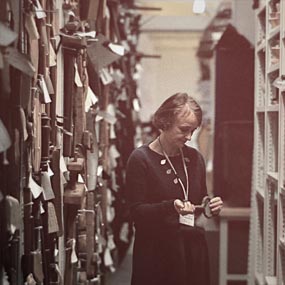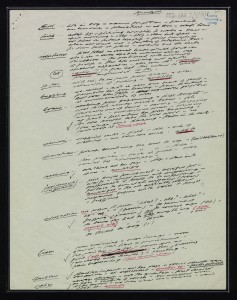Have you heard about the collections-based research programme here at Reading? Head of UMASC Kate Arnold-Forster and Head of the School of Literature and Languages Alison Donnell take a look at the ways in which collections-based research is changing the landscape of doctoral work.
This October, we’ll be welcoming the first cohort of a unique doctoral skills training programme here at Reading. Drawing on the extensive research potential of the University’s internationally recognised museums and collections, this programme will train doctoral students in the practical skills and intellectual sensitivities essential for quality collections-based research.
The programme responds to the notable ‘material turn’ within humanities research but reaches across and beyond this field to generate a multidisciplinary environment for postgraduate primary source and object-based learning. Our first cohort will embark on research projects across Archaeology, English, Italian, History, Film and Theatre, Typography and Classics – working on collections as diverse as evacuee diaries, Greek vases and Mills and Boon editorial papers. The main objective of this new programme is to develop skills in interdisciplinary approaches to objects and archives so that research students are equipped to fully explore the visual, historical, cultural and material aspects of their research collections.
The doctoral skills programme will also take advantage of the exceptional range of scholarly and practice-based opportunities that a combination of the University’s world class researchers, facilities and strong professional and external links with stakeholder organisations can provide. As well as writing their theses, students will have opportunities for placements and public engagement work that will enhance their employability by exposing them to experiences that may support future careers within and beyond academia. Building on recent investment in new teaching and learning expertise, the programme fits well with initiatives to embed collections-based teaching in undergraduate courses and will be a genuinely collaborative endeavour in harnessing a combination of academic knowledge and the experience and expertise of the University’s collections staff.
The University’s outstanding museums and collections will provide the key resource for this programme and act as an impressive focal point for developing the skills required to invigorate postgraduate research culture across a wide spectrum of disciplines. These collections are regarded as significant and unique both nationally and internationally. Three are nationally-designated: the Museum of English Rural Life (MERL), the Beckett Archive and the Archive of British Publishing and Printing. In addition the programme will engage the University’s other outstanding museums, the Cole Museum of Zoology and the Ure Museum of Greek Archaeology, departmental research and teaching collections (such as those of the Department of Typography & Graphic Communication, and the Herbarium), as well as smaller teaching sets such as a fine representative collection of 16th- to 20th- century drawings by European artists in the Department of Art.

Museum Studies Programme Director Dr Rhianedd Smith
What is exciting is the speed with which the programme has attracted new partnership opportunities for students, researchers and collections specialists to work collaboratively in building what we believe is a nationally distinctive and innovative pathway to a PhD. For example, Dr Teresa Murjas and Dr Lisa Purse from FTT will be supervising a research-practice PhD based on MERL’s Evacuee Archive. Funding from the Arts Council (ACE) has contributed to essential cataloguing and digitisation and to support an associated project that will allow Dr Murjas to develop a performance based on the Archive. At the same time, strategic opportunities are already beginning to shape this new programme as we build links with a number of independent research organisations (IROs) who now develop the projects for AHRC Collaborative Doctoral Awards. This year, students on our pilot training will have the chance to join training workshops for London-based IROs, such as the National Archives and British Museum, and students from these institutions will be joining us.
In a rapidly evolving environment for arts and humanities research, the long term aim of this new doctoral training programme is to strengthen Reading’s leading position in Collections-Based Research. It will take advantage of the remarkable quality and scope of the University’s museums and collections to attract postgraduate students, both nationally and internationally, and to build a community of researchers genuinely equipped to reveal, understand and communicate the potential of the university’s vast reserves of still hidden research treasures.




